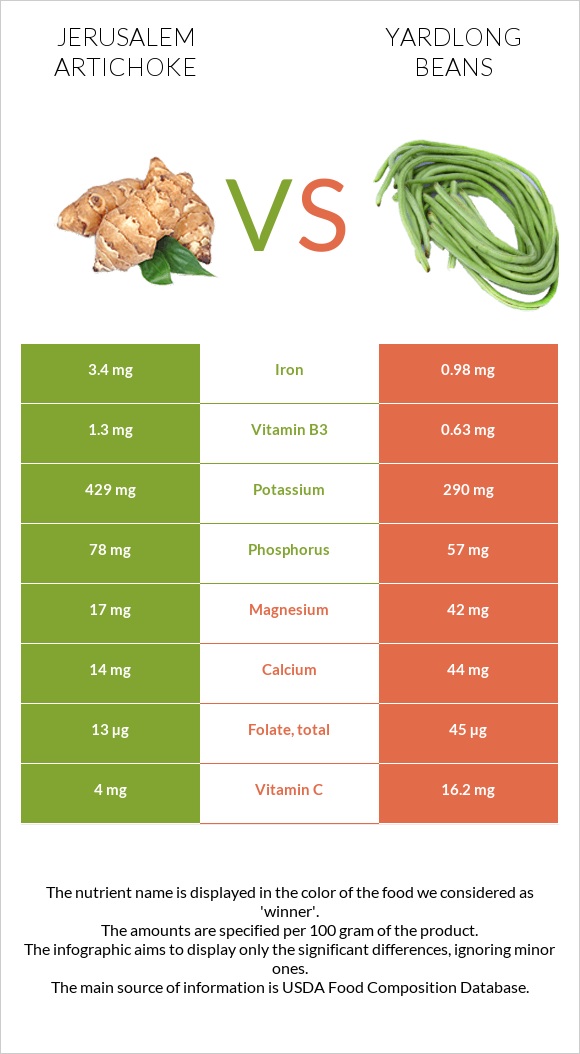Jerusalem artichoke vs. Yardlong beans — In-Depth Nutrition Comparison
Compare
What are the main differences between jerusalem artichoke and yardlong beans?
- Jerusalem artichoke is richer in iron, copper, vitamin B1, and vitamin B5, yet yardlong beans is richer in vitamin C, vitamin A, folate, manganese, and magnesium.
- Jerusalem artichoke's daily need coverage for iron is 30% higher.
- Jerusalem artichoke has 8 times more vitamin B5 than yardlong beans. Jerusalem artichoke has 0.397mg of vitamin B5, while yardlong beans has 0.051mg.
- Jerusalem artichoke has a lower glycemic index than yardlong beans.
We used Jerusalem-artichokes, raw and Yardlong bean, cooked, boiled, drained, without salt types in this comparison.
Infographic

Infographic link
Mineral Comparison
Mineral comparison score is based on the number of minerals by which one or the other food is richer. The "coverage" charts below show how much of the daily needs can be covered by 300 grams of the food.
| Contains more PotassiumPotassium | +47.9% |
| Contains more IronIron | +246.9% |
| Contains more CopperCopper | +197.9% |
| Contains more PhosphorusPhosphorus | +36.8% |
| Contains more MagnesiumMagnesium | +147.1% |
| Contains more CalciumCalcium | +214.3% |
| Contains more ZincZinc | +200% |
| Contains more ManganeseManganese | +235% |
| Contains more SeleniumSelenium | +114.3% |
Vitamin Comparison
Vitamin comparison score is based on the number of vitamins by which one or the other food is richer. The "coverage" charts below show how much of the daily needs can be covered by 300 grams of the food.
| Contains more Vitamin EVitamin E | +∞% |
| Contains more Vitamin B1Vitamin B1 | +135.3% |
| Contains more Vitamin B3Vitamin B3 | +106.3% |
| Contains more Vitamin B5Vitamin B5 | +678.4% |
| Contains more Vitamin B6Vitamin B6 | +220.8% |
| Contains more Vitamin KVitamin K | +∞% |
| Contains more Vitamin CVitamin C | +305% |
| Contains more Vitamin AVitamin A | +2200% |
| Contains more Vitamin B2Vitamin B2 | +65% |
| Contains more FolateFolate | +246.2% |
All nutrients comparison - raw data values
| Nutrient |  |
 |
DV% diff. |
| Iron | 3.4mg | 0.98mg | 30% |
| Vitamin C | 4mg | 16.2mg | 14% |
| Copper | 0.14mg | 0.047mg | 10% |
| Vitamin B1 | 0.2mg | 0.085mg | 10% |
| Folate | 13µg | 45µg | 8% |
| Vitamin B5 | 0.397mg | 0.051mg | 7% |
| Magnesium | 17mg | 42mg | 6% |
| Fiber | 1.6g | 6% | |
| Manganese | 0.06mg | 0.201mg | 6% |
| Choline | 30mg | 5% | |
| Potassium | 429mg | 290mg | 4% |
| Vitamin B3 | 1.3mg | 0.63mg | 4% |
| Vitamin B6 | 0.077mg | 0.024mg | 4% |
| Carbs | 17.44g | 9.18g | 3% |
| Calcium | 14mg | 44mg | 3% |
| Phosphorus | 78mg | 57mg | 3% |
| Vitamin B2 | 0.06mg | 0.099mg | 3% |
| Zinc | 0.12mg | 0.36mg | 2% |
| Vitamin A | 1µg | 23µg | 2% |
| Calories | 73kcal | 47kcal | 1% |
| Protein | 2g | 2.53g | 1% |
| Vitamin E | 0.19mg | 1% | |
| Selenium | 0.7µg | 1.5µg | 1% |
| Fats | 0.01g | 0.1g | 0% |
| Net carbs | 15.84g | 9.18g | N/A |
| Sugar | 9.6g | N/A | |
| Sodium | 4mg | 4mg | 0% |
| Vitamin K | 0.1µg | 0% | |
| Saturated fat | 0g | 0.026g | 0% |
| Monounsaturated fat | 0.004g | 0.009g | 0% |
| Polyunsaturated fat | 0.001g | 0.042g | 0% |
| Tryptophan | 0.029mg | 0% | |
| Threonine | 0.094mg | 0% | |
| Isoleucine | 0.135mg | 0% | |
| Leucine | 0.18mg | 0% | |
| Lysine | 0.166mg | 0% | |
| Methionine | 0.036mg | 0% | |
| Phenylalanine | 0.139mg | 0% | |
| Valine | 0.146mg | 0% | |
| Histidine | 0.082mg | 0% |
Macronutrient Comparison
Macronutrient breakdown side-by-side comparison
Protein:
2 g
Fats:
0.01 g
Carbs:
17.44 g
Water:
78.01 g
Other:
2.54 g
Protein:
2.53 g
Fats:
0.1 g
Carbs:
9.18 g
Water:
87.47 g
Other:
0.72 g
| Contains more CarbsCarbs | +90% |
| Contains more OtherOther | +252.8% |
| Contains more ProteinProtein | +26.5% |
| Contains more FatsFats | +900% |
| Contains more WaterWater | +12.1% |
Fat Type Comparison
Fat type breakdown side-by-side comparison
Saturated fat:
Sat. Fat
0 g
Monounsaturated fat:
Mono. Fat
0.004 g
Polyunsaturated fat:
Poly. Fat
0.001 g
Saturated fat:
Sat. Fat
0.026 g
Monounsaturated fat:
Mono. Fat
0.009 g
Polyunsaturated fat:
Poly. Fat
0.042 g
| Contains less Sat. FatSaturated fat | -100% |
| Contains more Mono. FatMonounsaturated fat | +125% |
| Contains more Poly. FatPolyunsaturated fat | +4100% |





